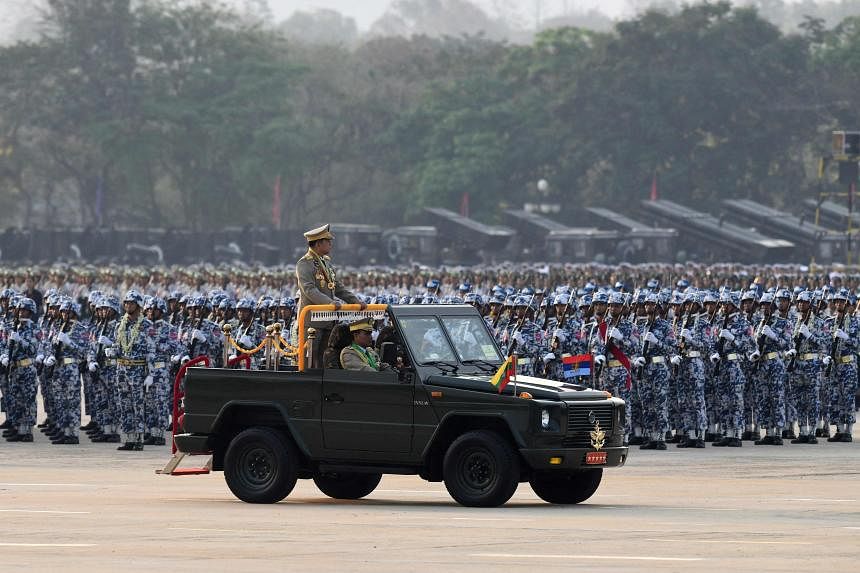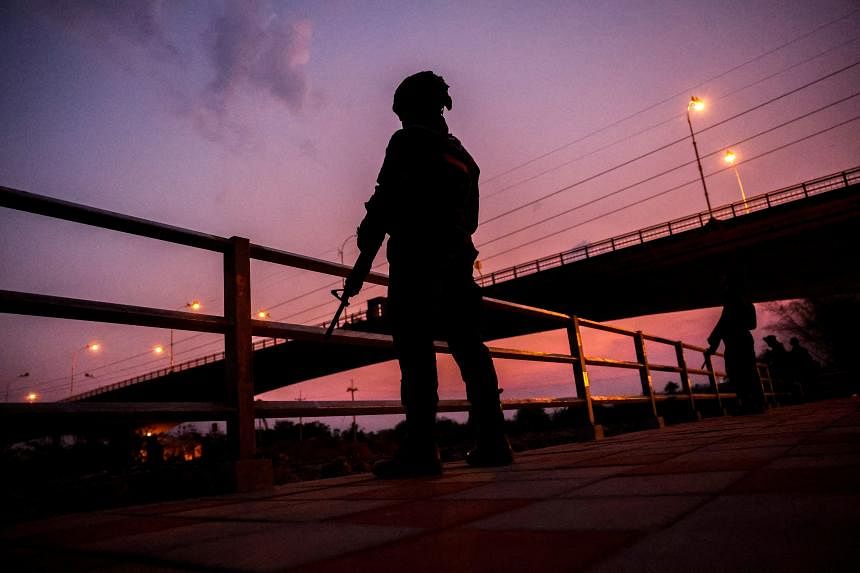For decades, the PAP government had been closing one eye to Myanmar generals laundering money through Singapore banks.
Myanmar military favouring Thai banks over Singapore banks for arms transactions: UN report
Myanmar's Chief Senior General Min Aung Hlaing stands in a vehicle as he attends a ceremony to mark the country's 78th Armed Forces Day. PHOTO: AFP
Varun Karthik
Updated
Jun 28, 2024
SINGAPORE – Myanmar’s junta is increasingly using banks in Thailand instead of Singapore for its purchases of military supplies, including arms used against groups opposing its 2021 power grab, according to a United Nations report.
The report, released by UN special rapporteur Tom Andrews on June 26, said banks located in Singapore were previously “the most important financial facilitators for Myanmar’s military procurement”, processing more thanUS$260 million (S$353 million) of arms payments between April 2022 and March 2023 (financial year 2022), which amounted to more than 70 per cent of the junta’s arms payments.
But the amount fell sharply to just over US$40 million between April 2023 and March 2024 (financial year 2023).
The report added that most of the US$40 million processed in financial year 2023 was done in the first quarter of that financial year.
Banks in Thailand went from facilitating over US$60 million worth of military procurement in financial year 2022 to processing more than double that – US$120 million – in financial year 2023.
However, the report noted that the financial institutions might not be helping facilitate military purchases wilfully.
“Nothing in the evidence reviewed by the Special Rapporteur suggests that banks named in this paper were directly aware of the nature of specific transactions they facilitated,” the report said.
It added that the junta was using “a variety of techniques to evade sanctions, undermine risk management processes and avoid transaction monitoring activities” to overcome the due diligence processes that banks had in place.
Thailand’s Ministry of Foreign Affairs said in a statement on June 27 that it had seen the report and was looking into it.
“We will have to first establish the facts before considering any further steps,” it said.
The drastic decrease in the purchase of weapons and related equipment processed in Singapore came after a government investigation prompted by an earlier report Mr Andrews released in May 2023.
That report alleged that Singapore-based companies were a source of substantial amounts of supplies for the junta, while banks were helping facilitate a significant amount of their procurement.
Mr Andrews said in an interview with The Straits Times on June 27: “(The Singapore Government) made a very focused effort to understand what was happening and to investigate these developments, and I was very happy to provide whatever support I could.”
Calling the progress Singapore made both “dramatic” and “very significant”, he said: “This is what can happen when a government makes this a priority (and) focuses on the facts”, adding that Singapore’s example serves as a “ray of light… for the region and the world”.
Much of Singapore’s decline in military-related procurement was attributed to UOB, which went from facilitating more than US$180 million in military procurement in financial year 2022 to none in financial year 2023.
“UOB is in full compliance with applicable sanction laws and regulations. We do not knowingly support or process any transaction in relation to weapons or military equipment involving the Myanmar military,” a UOB spokesperson said in a statement on June 28 in response to queries from ST.
“The bank’s policy prohibits processing of transactions involving arms and dual-use goods to entities known to be acting on behalf of the Myanmar military,” the spokesperson said, adding that the bank applied enhanced due diligence measures to mitigate the risks associated with higher-risk customers, and “(scrutinised) transactions to differentiate legitimate trade from those that result in the subjugation of the Myanmar people”.
The bank added that it had sought more information from the United Nations Special Rapporteur in December 2023 “when first alerted to the alleged transactions that occurred in 2022.
“Once we receive details of the alleged transactions, we will review them and take any necessary action as appropriate.”
Much of Thailand’s increase, on the other hand, was attributed to Siam Commercial Bank, which processed over US$100 million in arms transactions in financial year 2023, up from just over US$5 million in the year prior, the report said.
It noted that military procurements facilitated by financial institutions in Malaysia, Russia and South Korea had also decreased in financial year 2023, compared with 2022.
On top of the sharp drop in the amount of arms that the Myanmar military purchased through transactions facilitated by Singapore-based financial institutions, the report noted that there was a steep decline in the amount of arms and weapons materials exported to the junta from Singapore-registered entities.
Exports from Singapore-based entities in financial year 2023 were just over US$10 million, a mere fraction of the more than US$110 million exported in the year prior. Only six Singapore-based companies transferred weapons and related materials to the Myanmar military in financial year 2023, compared to 81 in 2022.
Military exports from Thailand, however, doubled to over US$120 million in financial year 2023.
Despite the increased amounts of military procurement flowing from Thailand, overall, the volume of weapons and military supplies that the Myanmar military could procure through the international financial system decreased by a third, aided by Singapore’s crackdown, according to the report.
It went from $377 million in financial year 2022 to $253 million in 2023.
In the interview, Mr Andrews said: “We have some important momentum now, that Singapore has played a key role in creating. And now is the time to build on that momentum”.
“We are moving in the right direction, but we have to do it in a more aggressive way, in a more strategic way, in a more coordinated way,” he added.
The Myanmar military
seized power in a February 2021 coup, and the country has since been plunged into political turmoil and violence as the junta battled anti-coup forces.
To crush the armed uprising, the junta stands accused of perpetrating human rights abuses against its own population, including the rampant use of air strikes that are said to have taken an enormous toll on civilians.
While there are no UN sanctions against Myanmar, some individual states – most notably the US – have imposed their own.
Among the entities the US has sanctioned include the Myanma Foreign Trade Bank, a state-owned bank that the report says “served as the primary bank facilitating foreign transactions involving Myanmar state-owned entities”.
In response, the junta has increasingly used Myanma Economic Bank, another state-owned bank that is, however, unsanctioned, to carry out key functions, according to the report.
Positing that there were “inherent and severe risks of doing business with Myanmar state-owned banks” even with due diligence checks in place, the report called for financial institutions to stop transacting with these banks entirely.
Other gaps in the sanctions mean that the country remains able to purchase aviation fuel, it added.
Independent analyst David Scott Mathieson said: “The (number of) air strikes is going up, but the ability of the international sanctions to stop them through (blocking) jet fuel sales, or other means, it is still not up there to make a real impact.”
He said the measures the report was advocating for, while important and welcomed, might not have a serious impact on the ability of the military to wage war, given that Myanmar has a domestic arms industry.
“As long as they are able to access raw materials and they are able to make bullets, weapons, landmines and lots of other things that can kill people, including artillery, (the junta) can keep fighting for quite some time,” he said.
A spokesperson for the non-profit Justice for Myanmar called on both Singapore and Thailand to do more.
“Singapore still needs to do more to resolve the crisis in Myanmar by ensuring no Myanmar arms brokers can operate in its territory and by imposing sanctions on Myanmar banks, as Singapore did in response to Russia’s invasion of Ukraine. Thailand must also do more to stop the transfer of weapons and related materials from companies registered in its territory,” said its spokesperson Yadanar Maung.


